Key takeaways:
- Password management is essential for online security and involves creating unique passwords and utilizing password managers for effective organization.
- Employing two-factor authentication and regularly updating passwords are crucial practices to enhance security and avoid breaches.
- The evolution of password management tools, including biometric authentication and AI integration, is shaping a more secure and user-friendly approach to managing online credentials.
- Developing a culture of digital responsibility is vital as every account, regardless of size, should be treated with equal importance in terms of security.
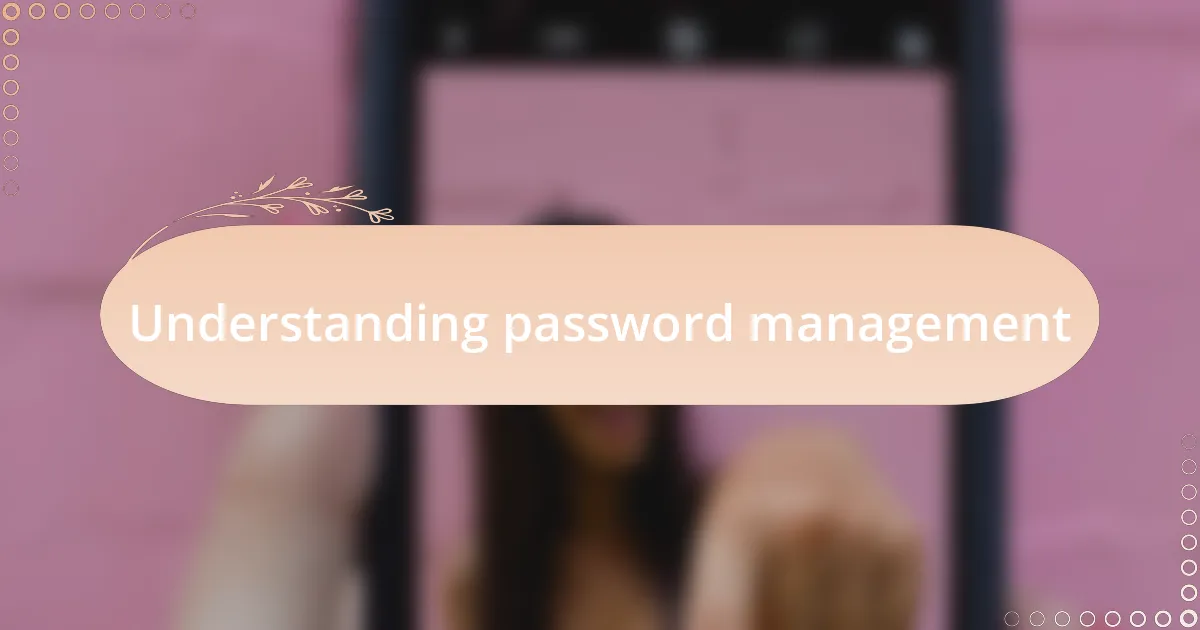
Understanding password management
When I first dove into password management, I realized it’s not just about having a strong password; it’s a comprehensive approach to online security. I used to think that a random string of letters and numbers would suffice, but I quickly learned the importance of managing those passwords effectively. How often have you felt the frustration of forgetting a password? That’s where a password manager steps in, helping to store and organize those vital credentials securely.
I remember a time when I had over ten different passwords for various accounts. It was overwhelming! I felt a mix of anxiety and confusion every time I tried to remember a specific password. This experience taught me that password management is about more than just convenience; it’s about reclaiming control over my digital life. The emotional weight lifted when I started using a password manager was significant—I could focus on what truly mattered instead of wrestling with forgotten passwords.
Understanding password management also involves recognizing the balance between complexity and usability. Many people, including myself, often struggle with creating secure passwords that are easy to remember. Have you ever resorted to using the same password across multiple sites to avoid the hassle? This mistake can lead to serious breaches, and I’m grateful for the lessons learned through my own missteps. With a sophisticated password manager, I can generate unique, complex passwords without the stress of memorizing them, allowing me to enhance my security while keeping my sanity intact.
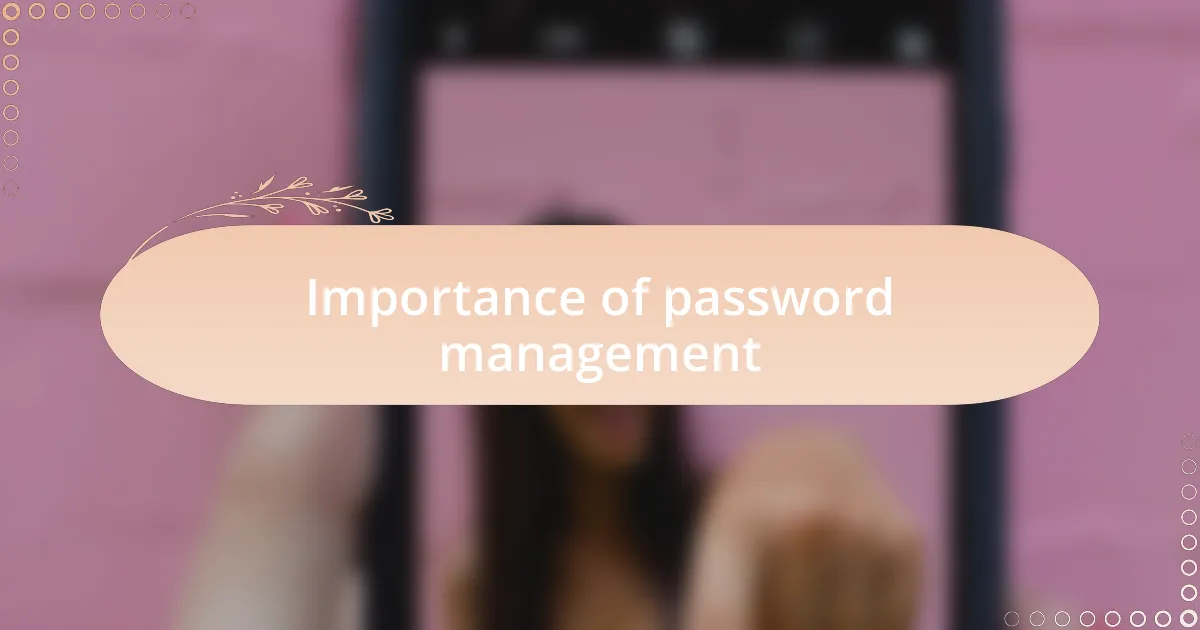
Importance of password management
The importance of password management goes beyond just security—it’s about peace of mind. I remember a point when I felt constantly on edge, worrying about whether my accounts were safe. Each notification of a potential data breach sent a wave of anxiety through me. By implementing a structured approach to my passwords, I found not just security but a newfound freedom to engage confidently online.
Think about how many platforms you use daily; it can be exhausting to keep track of varying password requirements. I once simplified my process by adopting a password manager, and it completely changed the way I interacted with technology. No more scrambling to recall where I might have stored sensitive information. Instead, I felt empowered knowing I had a tool at my disposal to safeguard my online presence effectively.
Ultimately, an effective password management system also fosters better habits. Have you ever caught yourself thinking, “This is just one small account; it’s not a big deal”? I’ve been there too, and I’ve learned that those small accounts are often the ones most vulnerable to attack. By treating every password with equal importance, I not only secured my accounts but also developed a culture of digital responsibility. It’s a reminder that, in today’s interconnected world, our online security starts and ends with the choices we make regarding our passwords.
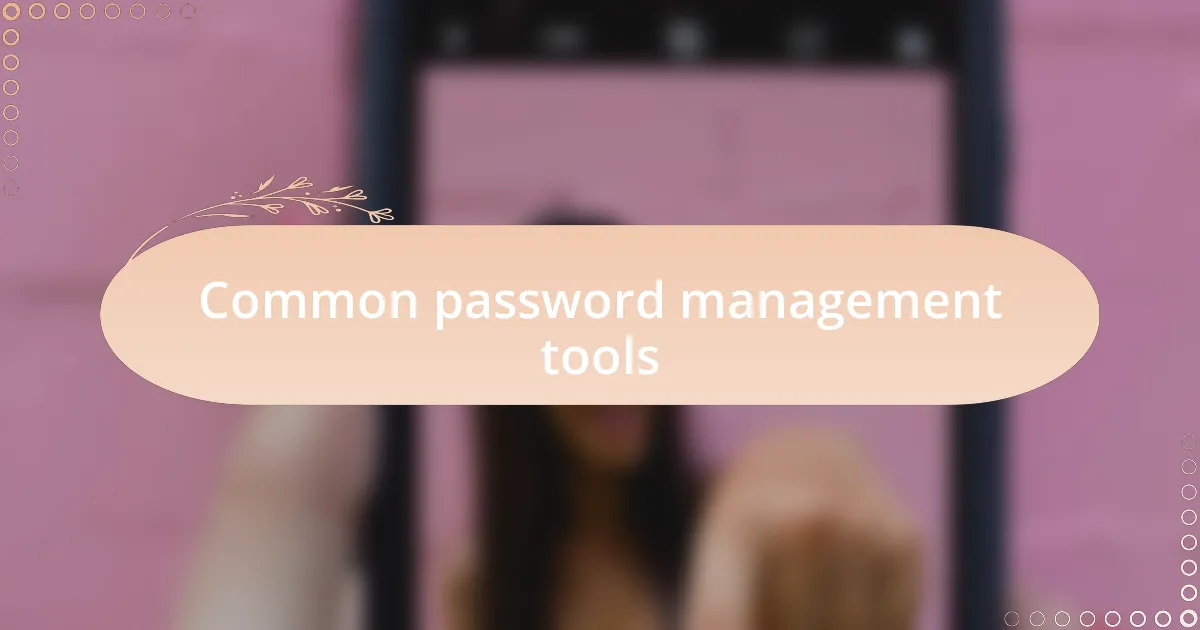
Common password management tools
When it comes to password management tools, I’ve found a few that stand out from the crowd. For instance, LastPass is one I often recommend—it securely stores your passwords and autofills them, making my online experience seamless. Once, I entered a site that required a complex password, and without a second thought, LastPass handled it for me. The relief I felt in that moment was tangible, knowing I didn’t have to strain my memory.
Another tool I’ve come to appreciate is Dashlane. It not only saves your passwords but also monitors the dark web for breaches associated with your credentials. I remember the sinking feeling when I discovered my information had been compromised. Thankfully, Dashlane alerted me, allowing me to take immediate action. It’s amazing how such tools can turn a moment of dread into a proactive opportunity to secure your accounts.
Let’s not overlook 1Password, too. Its user-friendly interface and secure sharing options make it a favorite for teams. I once collaborated on a project that involved countless logins and shared accounts; using 1Password allowed us to stay organized without sacrificing security. How reassuring is it to know that sensitive information can be shared securely among teammates? Tools like these transform password management from a tedious chore into a streamlined, secure process.
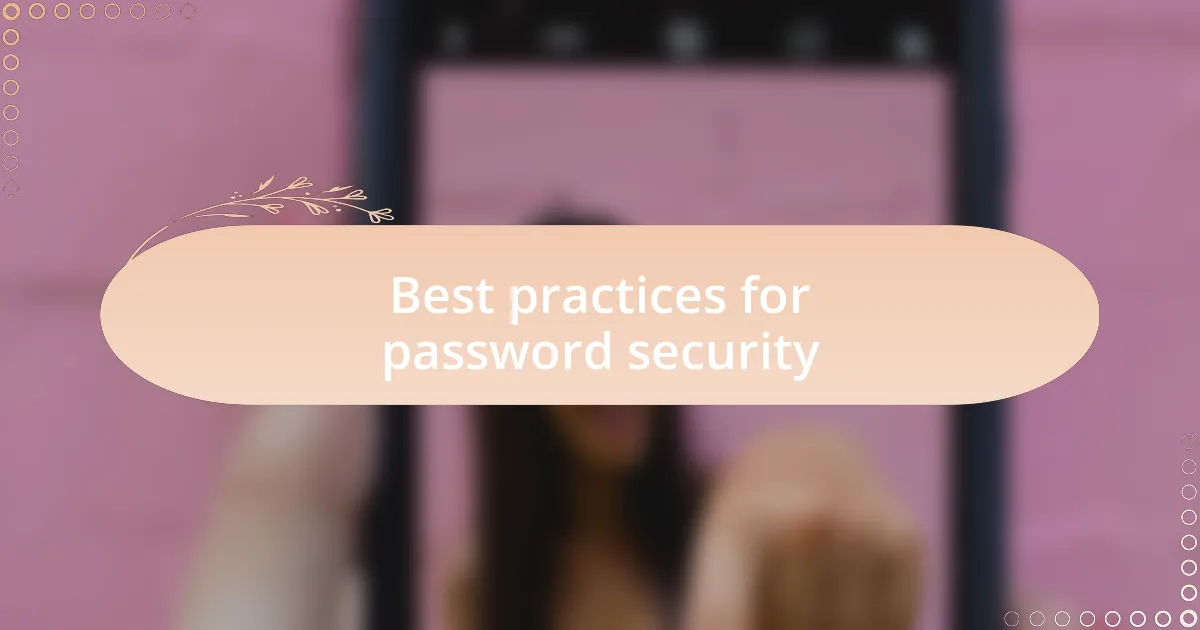
Best practices for password security
When it comes to password security, creating unique passwords for every account is a fundamental step I always emphasize. I once fell into the trap of reusing a single password across multiple platforms. That decision haunted me when one compromised account led to a domino effect, jeopardizing several others. This experience taught me that a unique password for each site not only secures individual accounts but also adds an essential layer of protection.
Employing two-factor authentication is another crucial strategy that I wholeheartedly recommend. I remember the first time I activated it on my email account; it felt like an armor of sorts. Even if someone managed to swipe my password, that extra verification step would act as a formidable barrier. Isn’t it reassuring to know there’s an additional safety net?
Also, regular password updates shouldn’t be overlooked. I recall a time when I let too much time pass between changes, only to read about a security breach that affected one of my frequently used services. The panic that set in was a wake-up call. By committing to changing my passwords every few months, I now feel more at ease, knowing I’m taking proactive steps toward safeguarding my information. Are you ready to make your password security a priority?
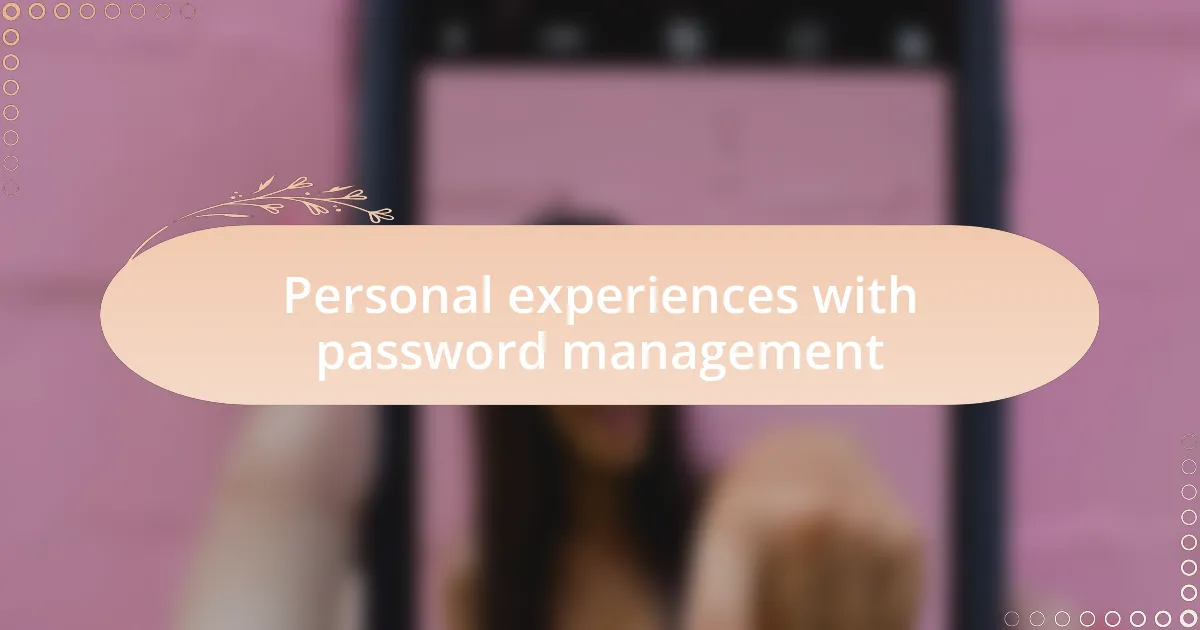
Personal experiences with password management
As I navigated the ever-growing landscape of online services, I quickly learned the importance of password management. I remember wrestling with traditional methods—scribbling passwords on sticky notes or trying to remember them all. But there’s a sense of vulnerability that comes with that approach, and it hit home when I lost access to crucial accounts after forgetting a simple password. In hindsight, using a password manager would have transformed my chaotic system into something secure and efficient.
Early on, I thought I could outsmart the system by creating clever, memorable passwords that combined important dates and favorite words. However, I soon realized I was not as clever as I thought; those passwords were easy targets for anyone trying to breach my accounts. I still cringe at the memory of receiving a notification that my online banking credentials were compromised, just because I thought I could “wing it.” Isn’t it crazy how we often underestimate the risks?
With time, I adopted a more structured approach. Organizing my passwords into various categories based on their sensitivity allowed me to manage them more effectively. I used to overlook the importance of evaluating the security level of each account. For instance, realizing that my social media accounts didn’t need the same level of protection as my email or banking accounts helped me prioritize better. It felt liberating to have clarity—like finding order in the chaos of my digital life. Have you taken the time to reflect on the structure of your own password management?
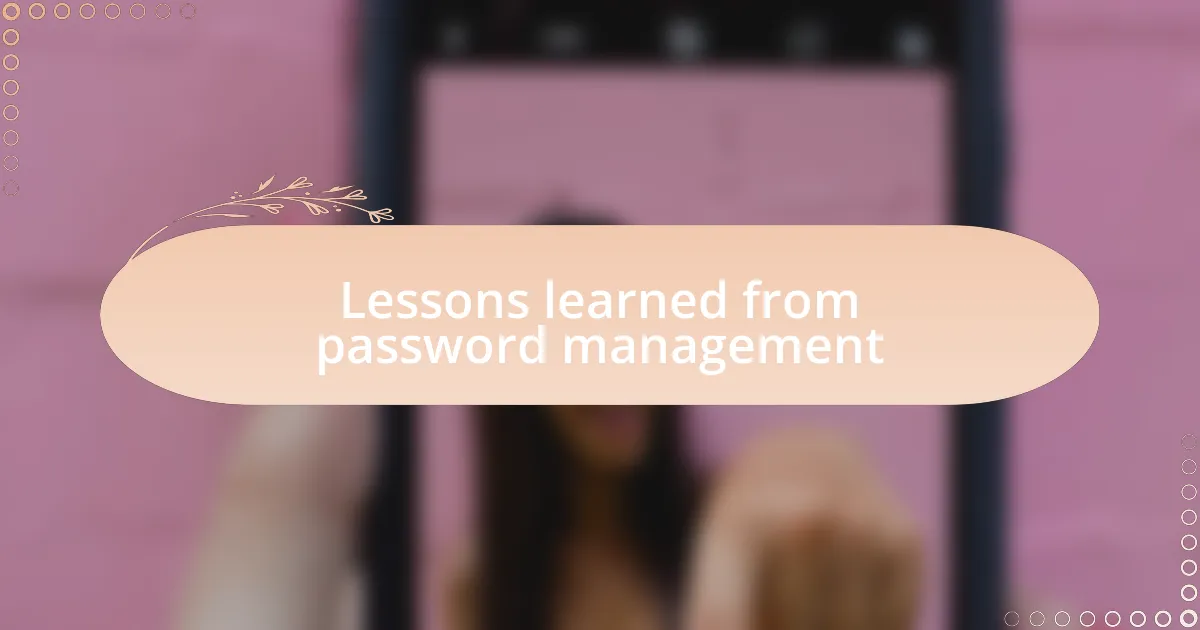
Lessons learned from password management
Password management has truly been a journey of discovery for me. I vividly recall the first time I used a password manager; it felt like I had finally gained control over my digital life. The simplicity of generating complex passwords with one click was eye-opening. Have you ever experienced that moment when everything just clicks into place?
One lesson that stood out was the importance of regular updates. Initially, I resisted the idea of changing my passwords frequently because it seemed tedious. However, after hearing about a major data breach that affected a service I used, I quickly realized the value of vigilance. Now, I schedule reminders, turning what felt like a chore into a proactive habit for my peace of mind.
I’ve also come to understand that sharing accounts can complicate password security. I once shared access to a streaming service with a friend, thinking it was harmless until I received a warning about unusual login attempts. This taught me the hard way that even trusted individuals could unknowingly pose a risk. Have you considered how your shared access might affect your overall security? It’s a crucial aspect that deserves our attention.

Future trends in password management
As I look toward the future of password management, I can’t help but think about the rise of biometric authentication. Imagine unlocking your accounts with a simple touch of your finger or a glance at your face. I remember the first time I used facial recognition on my phone—it felt like stepping into a science fiction movie. Biometric methods not only enhance security but also streamline access, making it incredibly user-friendly. Have you tried it?
Another trend gaining momentum is the integration of artificial intelligence in password management tools. I often envision how AI can analyze our login patterns and suggest personalized security measures. Just think about how much time we waste trying to remember passwords that are too complex for our brains! I can see AI learning from my habits, reminding me when to change passwords and suggesting stronger alternatives, almost like a personal trainer for my digital security. Isn’t that a fascinating prospect?
Lastly, I find it intriguing how corporate policies are evolving around password management. With companies increasingly recognizing the risks associated with weak passwords, I’ve seen firsthand the shift toward implementing stricter guidelines. I remember a workshop where the IT team stressed the need for two-factor authentication; it really opened my eyes to the larger picture of organizational security. It makes me wonder: are we ready to embrace a future where strong password policies are not just a necessity but a standard practice?